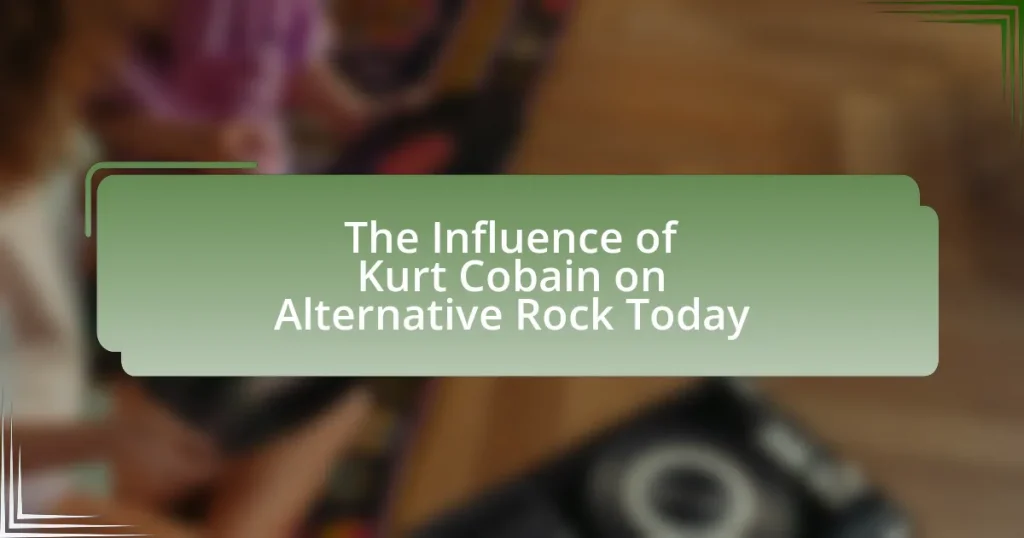Kurt Cobain, the frontman of Nirvana, has had a significant and lasting influence on alternative rock, shaping its sound, themes, and cultural identity. His 1991 album “Nevermind” brought grunge into the mainstream, characterized by raw emotional songwriting and a blend of punk and melodic elements. Cobain’s legacy continues to resonate with contemporary artists, who cite him as an inspiration for their authenticity and vulnerability in music. The article explores how Cobain’s musical innovations, cultural impact, and personal struggles have redefined rock stardom and continue to influence modern alternative rock bands and musicians today.

What is the Influence of Kurt Cobain on Alternative Rock Today?
Kurt Cobain’s influence on alternative rock today is profound, as he shaped the genre’s sound, aesthetics, and cultural significance. His band Nirvana’s 1991 album “Nevermind” revolutionized rock music, bringing grunge and alternative rock into the mainstream, which is evidenced by its over 30 million copies sold worldwide. Cobain’s raw, emotional songwriting and anti-establishment ethos inspired countless artists, leading to a wave of alternative rock bands in the 1990s and beyond, such as Foo Fighters and Radiohead, who cite him as a major influence. Additionally, Cobain’s legacy continues to resonate through contemporary artists who embrace authenticity and vulnerability in their music, reflecting his lasting impact on the genre.
How did Kurt Cobain shape the sound of alternative rock?
Kurt Cobain significantly shaped the sound of alternative rock by blending punk rock’s raw energy with melodic elements and introspective lyrics. His band, Nirvana, achieved mainstream success with the album “Nevermind,” which featured the iconic single “Smells Like Teen Spirit,” a track that epitomized the grunge movement and brought alternative rock into the mainstream in the early 1990s. Cobain’s songwriting often addressed themes of alienation and disillusionment, resonating with a generation and influencing countless artists. The raw production style and emotional authenticity of Nirvana’s music set a precedent for future alternative rock bands, establishing a sound characterized by heavy guitar riffs, dynamic shifts, and a focus on personal expression.
What musical elements did Cobain introduce to the genre?
Kurt Cobain introduced several musical elements to the alternative rock genre, notably a blend of punk rock’s raw energy with melodic sensibilities. His use of dynamic contrasts, characterized by quiet verses and explosive choruses, became a defining feature of the genre, exemplified in songs like “Smells Like Teen Spirit.” Additionally, Cobain’s incorporation of dissonant guitar riffs and unconventional song structures challenged traditional rock norms, influencing countless bands in the 1990s and beyond. His lyrical themes often explored personal and societal issues, adding depth to the genre and resonating with a generation.
How did Cobain’s songwriting influence other artists?
Kurt Cobain’s songwriting significantly influenced other artists by introducing raw emotional honesty and a blend of punk and melodic elements that reshaped alternative rock. His ability to articulate feelings of alienation and disillusionment resonated with a generation, inspiring bands like Foo Fighters and My Chemical Romance to explore similar themes in their music. Cobain’s use of unconventional song structures and introspective lyrics encouraged artists to prioritize authenticity over commercial appeal, leading to a broader acceptance of diverse musical styles within the genre. This impact is evident in the way contemporary musicians often cite Nirvana as a pivotal influence in their creative processes, demonstrating Cobain’s lasting legacy in shaping the sound and ethos of alternative rock.
What cultural impact did Kurt Cobain have on alternative rock?
Kurt Cobain significantly shaped the cultural landscape of alternative rock by popularizing the genre in the early 1990s through his band Nirvana. His raw, emotive songwriting and distinctive sound, characterized by a blend of punk rock and melodic elements, resonated with a generation disillusioned by mainstream music. The release of Nirvana’s album “Nevermind” in 1991, which featured the iconic single “Smells Like Teen Spirit,” propelled alternative rock into the mainstream, leading to a surge in popularity for similar bands and the genre as a whole. Cobain’s authenticity and openness about personal struggles, including mental health and societal issues, influenced countless artists and fans, fostering a culture of vulnerability and honesty in music. His impact is evident in the continued relevance of alternative rock, as many contemporary artists cite him as a major influence, demonstrating his lasting legacy in shaping the genre’s identity and cultural significance.
How did Cobain’s persona redefine rock stardom?
Kurt Cobain’s persona redefined rock stardom by embodying authenticity and vulnerability, contrasting sharply with the glamor and excess typically associated with rock icons. His raw emotional expression and rejection of traditional rock star behavior resonated with a generation, making him a symbol of the grunge movement. Cobain’s candidness about his struggles with mental health and substance abuse, as seen in interviews and lyrics, challenged the facade of invincibility often upheld by rock stars. This shift encouraged artists to embrace their flaws and personal narratives, fostering a more relatable and honest connection with fans. The impact of Cobain’s approach is evident in the subsequent rise of artists who prioritize authenticity over image, reshaping the expectations of what it means to be a rock star.
What role did Cobain play in the grunge movement?
Kurt Cobain was a pivotal figure in the grunge movement, serving as the frontman of Nirvana, a band that defined the genre. His songwriting, characterized by raw emotion and introspective lyrics, resonated with a generation disillusioned by mainstream culture. Cobain’s 1991 album “Nevermind” propelled grunge into the mainstream, featuring the iconic single “Smells Like Teen Spirit,” which became an anthem for youth angst. This success not only popularized grunge but also influenced countless artists and bands, solidifying Cobain’s legacy as a key architect of the movement.
Why is Kurt Cobain still relevant in today’s alternative rock scene?
Kurt Cobain remains relevant in today’s alternative rock scene due to his profound influence on the genre’s sound, themes, and cultural identity. His band, Nirvana, revolutionized music in the early 1990s with the release of “Nevermind,” which introduced grunge to mainstream audiences and shifted the focus from glam rock to a more raw and authentic sound. Cobain’s songwriting, characterized by its emotional depth and exploration of personal and societal issues, continues to resonate with contemporary artists and fans alike.
Moreover, Cobain’s legacy is evident in the work of modern alternative rock bands such as Foo Fighters and Paramore, who cite Nirvana as a significant influence. The ongoing popularity of Nirvana’s music, evidenced by millions of album sales and streaming numbers, further solidifies Cobain’s lasting impact on the genre. His struggles with mental health and advocacy for authenticity in music continue to inspire discussions around artist vulnerability, making him a timeless figure in alternative rock.
How do contemporary artists cite Cobain as an influence?
Contemporary artists cite Kurt Cobain as an influence primarily through their musical style, lyrical themes, and public statements. Many musicians, such as Billie Eilish and Post Malone, have acknowledged Cobain’s impact on their approach to songwriting and performance, often referencing his raw emotional expression and authenticity. For instance, Billie Eilish has mentioned in interviews that Cobain’s ability to convey vulnerability in his music resonates with her own artistic vision. Additionally, the grunge aesthetic and DIY ethos that Cobain embodied continue to inspire a new generation of artists, leading them to adopt similar approaches in their music and visual presentations. This influence is evident in the resurgence of lo-fi production techniques and introspective lyrics that characterize much of today’s alternative rock scene.
What themes from Cobain’s work resonate with today’s musicians?
Themes from Kurt Cobain’s work that resonate with today’s musicians include authenticity, mental health struggles, and social alienation. Cobain’s emphasis on genuine expression and vulnerability in songwriting has inspired contemporary artists to embrace their true selves and share personal experiences. His candid discussions of depression and anxiety in songs like “Lithium” and “All Apologies” have paved the way for musicians to address mental health openly, reflecting a growing trend in the industry. Additionally, Cobain’s critique of societal norms and commercialism, evident in tracks such as “Smells Like Teen Spirit,” continues to influence today’s musicians who seek to challenge mainstream culture and advocate for individuality.
How has Kurt Cobain’s legacy influenced modern alternative rock bands?
Kurt Cobain’s legacy has profoundly influenced modern alternative rock bands by shaping their musical style, lyrical themes, and cultural identity. His raw, emotive songwriting and the blending of punk and melodic elements in Nirvana’s music set a precedent for authenticity and vulnerability in lyrics, which many contemporary bands emulate. For instance, artists like Billie Eilish and the band Paramore have cited Cobain’s influence in their approach to songwriting, often addressing personal and societal issues with a similar intensity. Additionally, Cobain’s anti-establishment attitude and rejection of mainstream norms resonate with today’s alternative rock artists, encouraging them to maintain an independent spirit and authenticity in their work. This legacy is evident in the continued popularity of grunge-inspired sounds and the emphasis on emotional honesty in modern alternative rock.
What are some notable bands influenced by Cobain?
Notable bands influenced by Kurt Cobain include Foo Fighters, Pearl Jam, and Bush. Foo Fighters, formed by former Nirvana drummer Dave Grohl, carry forward the grunge sound that Cobain popularized. Pearl Jam emerged around the same time as Nirvana and adopted a similar ethos, blending rock with introspective lyrics, a hallmark of Cobain’s style. Bush, a British band, incorporated elements of grunge into their music, reflecting Cobain’s impact on the alternative rock scene of the 1990s. These bands exemplify the lasting influence of Cobain’s artistry on subsequent generations of musicians.
How do these bands incorporate Cobain’s style into their music?
Bands incorporate Kurt Cobain’s style into their music primarily through the use of raw, emotional lyrics and a blend of melodic and dissonant guitar sounds. For example, many contemporary alternative rock bands emulate Cobain’s introspective songwriting, which often addresses themes of alienation and personal struggle, similar to the lyrical content found in Nirvana’s “Nevermind.” Additionally, the use of dynamic shifts in song structure, characterized by quiet verses followed by explosive choruses, is a hallmark of Cobain’s influence, evident in tracks by bands like Foo Fighters and Bush. This approach not only pays homage to Cobain’s signature sound but also resonates with listeners who connect with the authenticity and vulnerability that defined his music.
What specific songs or albums reflect Cobain’s influence?
Songs and albums that reflect Kurt Cobain’s influence include “Take Me Out” by Franz Ferdinand and “Last Nite” by The Strokes. These tracks showcase the raw emotion and grunge aesthetic that Cobain popularized with Nirvana’s “Nevermind” and “In Utero.” The impact of Cobain’s songwriting style, characterized by introspective lyrics and a blend of melodic hooks with heavy instrumentation, can be seen in the resurgence of alternative rock bands in the 2000s. Additionally, albums like “Is This It” by The Strokes and “Silent Alarm” by Bloc Party echo Cobain’s influence through their gritty sound and lyrical themes of disillusionment, mirroring the cultural sentiments that Cobain expressed in his work.
In what ways do modern artists pay tribute to Kurt Cobain?
Modern artists pay tribute to Kurt Cobain through various means, including musical covers, lyrical references, and visual art inspired by his legacy. For instance, artists like Billie Eilish and Post Malone have covered Nirvana songs, showcasing Cobain’s influence on contemporary music. Additionally, many musicians incorporate themes of mental health and authenticity in their work, reflecting Cobain’s own struggles and artistic ethos. Visual tributes also abound, with artworks and merchandise celebrating his iconic style and persona, further solidifying his impact on modern culture. These actions collectively highlight Cobain’s enduring influence on the alternative rock genre and beyond.
What are some examples of tributes in music and media?
Examples of tributes in music and media include the song “Come As You Are” by the band Pearl Jam, which pays homage to Kurt Cobain and Nirvana’s influence on alternative rock. Additionally, the documentary “Kurt Cobain: Montage of Heck” serves as a tribute by exploring Cobain’s life and artistry through personal footage and interviews. Another example is the tribute concert “Love for Levon,” which honored Levon Helm but also recognized the broader impact of artists like Cobain on the music industry. These tributes highlight the lasting legacy of influential figures in music and their contributions to the genre.
How do these tributes reflect Cobain’s impact on the genre?
Tributes to Kurt Cobain reflect his profound impact on the alternative rock genre by showcasing the enduring influence of his music and ethos on contemporary artists. Many modern musicians cite Cobain as a pivotal figure who shaped their sound and lyrical themes, emphasizing authenticity and emotional vulnerability. For instance, artists like Billie Eilish and Post Malone have acknowledged Cobain’s legacy in their work, often incorporating elements of grunge and introspective songwriting that he popularized. Additionally, tribute concerts and cover songs serve as a testament to his lasting relevance, with performances of Nirvana’s hits demonstrating how his innovative approach continues to resonate with new generations. These tributes not only honor Cobain’s contributions but also highlight the ongoing evolution of alternative rock, rooted in the foundation he helped establish.
What challenges do artists face when following in Kurt Cobain’s footsteps?
Artists face significant challenges when following in Kurt Cobain’s footsteps, primarily due to the immense pressure to replicate his unique sound and authenticity. This pressure often leads to struggles with identity, as artists may feel compelled to conform to the grunge aesthetic and lyrical themes that Cobain popularized, which can stifle their individual creativity. Additionally, the legacy of Cobain’s tragic life and untimely death creates a daunting shadow; artists may grapple with mental health issues and substance abuse, mirroring Cobain’s own battles. The music industry also presents obstacles, as it often prioritizes commercial success over artistic expression, making it difficult for new artists to maintain the rawness and honesty that characterized Cobain’s work. These factors collectively contribute to a challenging environment for artists attempting to honor Cobain’s influence while forging their own paths in alternative rock.
How does the pressure of legacy affect new alternative rock musicians?
The pressure of legacy significantly impacts new alternative rock musicians by creating high expectations for originality and authenticity. This pressure often stems from the iconic status of predecessors like Kurt Cobain, whose work set a benchmark for emotional depth and musical innovation. As a result, emerging artists may feel compelled to either emulate the styles of past legends or strive to redefine the genre, which can lead to creative anxiety and a struggle for identity. For instance, studies indicate that many new musicians cite Cobain as a major influence, which can create a paradox where they seek to honor his legacy while also wanting to carve out their own unique sound. This duality can hinder artistic freedom and lead to a fear of failure, as the weight of historical significance looms large over their creative processes.
What expectations do artists feel regarding authenticity and originality?
Artists expect authenticity and originality to be fundamental aspects of their work, as these qualities are essential for establishing a genuine connection with their audience. Authenticity allows artists to express their true selves and experiences, while originality distinguishes their work in a saturated market. Research indicates that artists often feel pressured to maintain these standards due to the influence of iconic figures like Kurt Cobain, who emphasized personal expression and authenticity in their music. Cobain’s legacy has shaped contemporary expectations, leading artists to prioritize unique perspectives and honest storytelling in their creative processes.
How do artists navigate the comparison to Cobain’s work?
Artists navigate the comparison to Kurt Cobain’s work by emphasizing their unique artistic identities while acknowledging his influence. Many contemporary musicians express admiration for Cobain’s songwriting and emotional authenticity, using it as a benchmark for their own creative processes. For instance, artists like Billie Eilish and Phoebe Bridgers have cited Cobain’s rawness and vulnerability as inspirations, yet they differentiate themselves through distinct musical styles and personal narratives. This approach allows them to honor Cobain’s legacy while carving out their own space in the alternative rock genre.
What lessons can modern musicians learn from Kurt Cobain’s career?
Modern musicians can learn the importance of authenticity and emotional honesty from Kurt Cobain’s career. Cobain’s raw and genuine expression of personal struggles in his music resonated deeply with audiences, exemplified by songs like “Smells Like Teen Spirit” and “Heart-Shaped Box,” which addressed themes of alienation and despair. His willingness to confront his vulnerabilities not only defined Nirvana’s sound but also set a precedent for future artists to prioritize sincerity over commercial appeal. Additionally, Cobain’s resistance to the pressures of fame and his advocacy for artistic integrity serve as a reminder for contemporary musicians to stay true to their vision and values, even in a highly commercialized industry.
How can artists balance personal expression with commercial success?
Artists can balance personal expression with commercial success by strategically integrating their authentic voice into marketable formats. This approach allows artists to maintain their individuality while appealing to broader audiences. For instance, many successful musicians, like Taylor Swift, have crafted songs that reflect personal experiences while employing catchy melodies and relatable themes, which enhances commercial viability. Research indicates that artists who blend personal narratives with universal themes often achieve greater market success, as seen in the rise of alternative rock influenced by Kurt Cobain, where raw emotion and relatable lyrics resonated with a wide audience, leading to significant commercial achievements.
What strategies can artists use to honor Cobain’s influence while forging their own path?
Artists can honor Kurt Cobain’s influence while forging their own path by integrating elements of his raw emotional expression and authenticity into their music, while also experimenting with their unique sound and lyrical themes. For instance, many contemporary artists draw inspiration from Cobain’s candidness about mental health and societal issues, which resonates with today’s audiences. This approach allows them to pay homage to Cobain’s legacy while addressing current topics relevant to their own experiences. Additionally, artists can adopt a DIY ethos reminiscent of Cobain’s early career, encouraging independence and innovation in their creative processes. This strategy not only respects Cobain’s impact on the music industry but also empowers artists to carve out their distinct identities.


